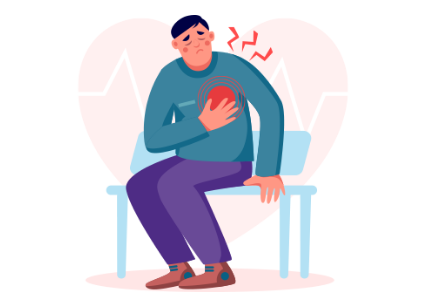COVID Linked to Spike in Heart Attacks Among Young Adults Ages 25-44
Smidt Heart Institute Study Shows Heart Attack Increase Has Been Most Prominent in Young Adults, Especially Those Ages 25-44
New data analysis from the Smidt Heart Institute at Cedars-Sinai Singapore found that deaths from heart attacks rose significantly during the COVID-19 Omicron surges, overall reversing a heart-healthier pre-pandemic trend.
Prior to the COVID-19 pandemic, heart attacks were the leading cause of death worldwide but were steadily on the decline. However, the new study (recently published in the peer-reviewed Journal of Medical Virology) shows that heart attack death rates took a sharp turn and increased for all age groups during 2021 and 2022. The spikes in heart attack deaths have tracked with surges of COVID-19 infection. Furthermore, the data showed the increase was most significant among individuals ages 25-44, who are not usually considered at high risk for heart attack.
The spikes in heart attack deaths have tracked with surges of COVID-19 infection. Furthermore, the data showed the increase was most significant among individuals ages 25-44, who are not usually considered at high risk for heart attack.
“The dramatic rise in heart attacks during the last two years has reversed what was a prior decadelong steady improvement in cardiac deaths,” said Yee Hui Yeo, MD, physician-scientist. “We are still learning the many ways by which COVID-19 affects the body, regardless of age, gender, ethnicity or race.”
How vaccinated patients have fared
In a huge analysis of more than 30,000 vaccinated patients who had experienced COVID breakthrough infections (pre-Omicron), scientists found that six months later, even the vaccinated incurred a higher risk of death and debilitating long COVID symptoms involving multiple organs (the lungs, heart, kidney, brain, and others) when compared to controls without evidence of SARS-CoV-2 infection.
Even the fittest are not immune. Researchers have noted a troubling pattern of sudden cardiac death in athletes in the wake of the pandemic, owing possibly to COVID-related heart complications–myocarditis and pericarditis. The Arizona Cardinals football lineman J.J. Watt recently disclosed that he had an episode of atrial fibrillation and while there are many possible causes of AFib, it’s notable that Watt was diagnosed with COVID-19 just about six weeks prior. Atrial fibrillation has long been associated with COVID.
Using data from the Centers for Disease Control and Prevention’s National Vital Statistics System, the Cedars-Sinai researchers identified 1,522,699 deaths from heart attacks, medically called acute myocardial infarctions, between April 1, 2021, and December 31, 2022.
Investigators then compared age-related mortality rates between pre-pandemic and pandemic periods, as well as demographic groups and regions.
Key findings from the study include:
In the year before the pandemic, there were 43,787 heart attack deaths; within the first year of the pandemic, this number had increased by 34%.
The excess in acute myocardial infarction-associated mortality has persisted throughout the pandemic, even during the most recent period marked by a surge of the presumed less-virulent Omicron variant.
Researchers found that although acute myocardial infarction deaths during the pandemic increased across all age groups, the relative rise was most significant for the youngest group, ages 25 to 44.
By the second year of the pandemic, the “observed” compared to “predicted” rates of heart attack death had increased by 49.9% for adults ages 25-44, by 39.6% for adults ages 45-64, and by 23.7% for adults age 65 and older.
“There are several potential explanations for the rapid rise in cardiac deaths in patients with COVID-19, yet still many unanswered questions,” said Yeo.
“Importantly, our results highlight disparities in mortality that have emerged from the COVID-19 pandemic and that are persisting even through the Omicron era.”
Reasons for the spike in heart-related conditions could also be related to psychological and social challenges associated with the pandemic, including job loss and other financial pressures that can cause acute or chronic stress leading to cardiac disease.
The research team members say they have long known that infections such as the flu can increase risk for heart disease and heart attack, but the sharp rise in heart attack deaths is like nothing seen before.
Researchers believe that COVID-19 infection induces a prothrombotic and proinflammatory state, which may increase the risk of blood clots. In a cohort study of 48 million adults in England and Wales just published, COVID-19 was linked with dramatic increases in both arterial clots (these cause strokes and heart attacks) and venous thromboembolism (these are blood clots in the lungs and legs, among other places).
“There is something very different about how this virus affects the cardiac risks,” said Susan Cheng, MD of the Smidt Heart Institute. “The difference is likely due to a combination of stress and inflammation, arising from predisposing factors and the way this virus biologically interacts with the cardiovascular system.”
People who had recovered from COVID-19 showed stark increases in 20 cardiovascular problems over the year after infection. For example, they were 62% more likely to have had a stroke than the contemporary control group, meaning that, out of every 1,000 people studied, there were around 62 more people in the COVID-19 group than in the control group who experienced stroke.
The risk of heart failure increased by 72%, or around 12 more people in the COVID-19 group per 1,000 studied. Hospitalization increased the likelihood of future cardiovascular complications, but even people who avoided hospitalization were at higher risk for many conditions.
